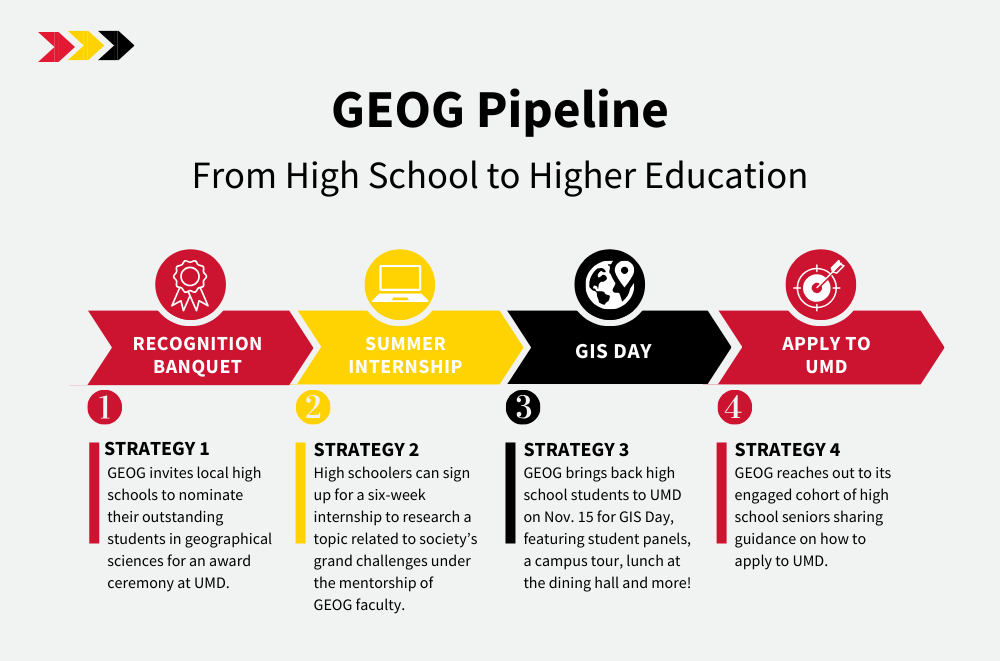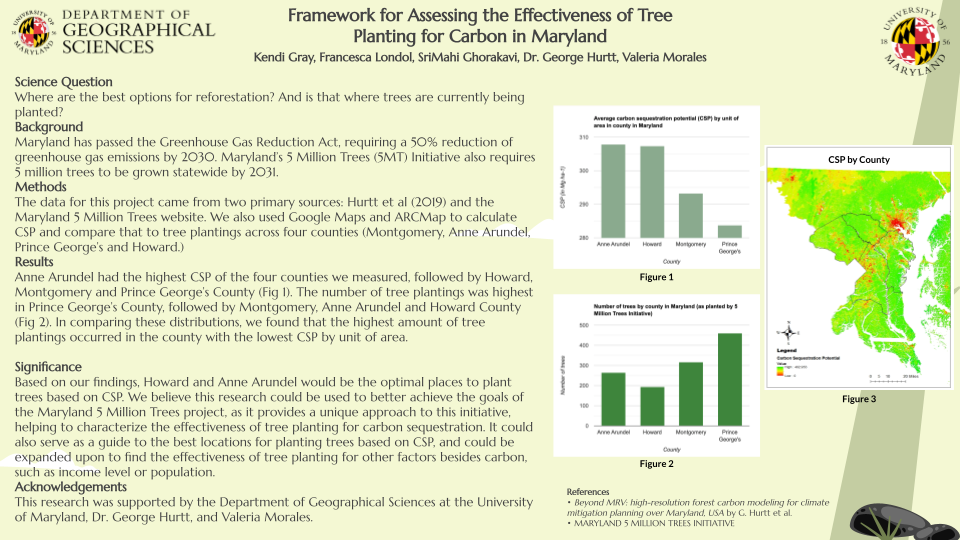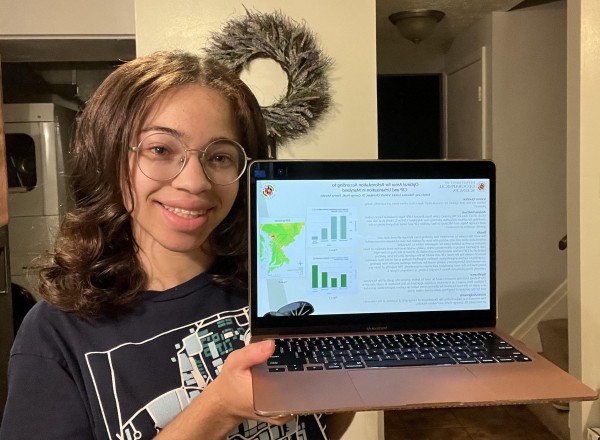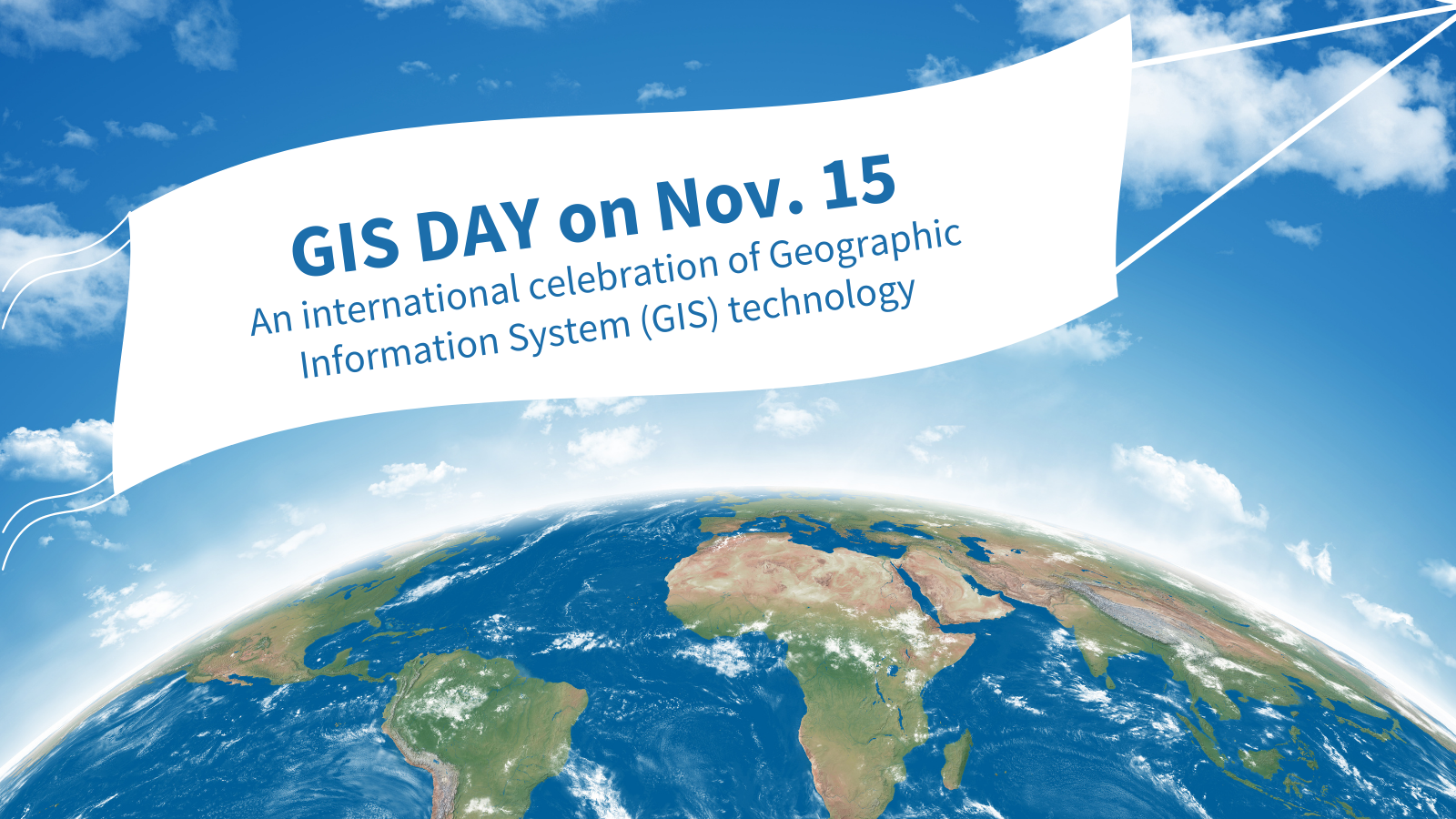GEOG Launches High School Internship Program to Cultivate Future Scholars
With a vision to inspire the next generation of researchers to tackle society's grand challenges, the Department of Geographical Sciences launched in the summer its inaugural High School Internship Program (HIP). The initiative aims to captivate the minds of high school juniors and seniors by providing them with hands-on research experience in geographical sciences.
The 2023 HIP program welcomed 15 students across the region who delved into eight research projects spanning topics like climate change, greenhouse gas emissions; geospatial analysis, agriculture and pollution; and more. Each student was paired with a GEOG faculty member who acted as a mentor around an issue of common interest.
The entire program was conducted remotely, running from June 20 to Aug. 11. In recognition of their dedication, interns received a stipend of $900 for their commitment to 10 hours of work per week over six weeks.
"It's all about the concept of learning through practical experience, uncovering new knowledge, and getting the gratification of discovery that comes from research," said GEOG Professor and Associate Chair George Hurtt, who spearheaded the initiative along with Department Chair Tatiana Loboda and faculty specialist Valeria Morales. "What the interns experience in six weeks is a preview of what professional scientists experience during their projects,” he added.
The program received support from an experiential learning component of the University of Maryland’s Grand Challenges Institutional Grant “Assessing Climate Challenges for a Sustainable Earth”. Led by Professors Ellen Williams (Principal Investigator-ESSIC), Timothy Canty (MEES), James Farquhar (GEOL), Loboda (GEOG) and Sumant Nigam (AOSC), the project aims to help the stakeholders in the state of Maryland to minimize the negative impacts of climate change.
“Bringing experiential learning opportunities to graduate, undergraduate and high school students is a crucial pathway of engaging the broader society and training the new generation in solving some of the most pressing societal issues of our time,” Loboda said.
Upon completion of the program, students had the opportunity to present their research through a poster presentation, akin to the practice of academics at scientific conferences.
“From the final presentation from the student, it was very clear the program succeeded in engaging the next generation of scientists and researchers, said Assistant Professor Catherine Nakalembe, a dedicated mentor despite her busy summer schedule. "It was great to see the students’ enthusiasm for hands-on research and their eagerness to apply new technical skills."
Co-organizer Morales served as the main point of contact with all the students, a role that held a meaningful connection for her. Being an alum of Prince George’s County, the very place many of the interns hailed from, she felt an immediate bond. “It was so nice to see students from my county and from my high school participating in this program,” she said. “Two of the students in George’s group were from my school, so it was personally rewarding to see these young ladies —all women of color— do these things that I wished I had done in high school.”

The HIP is a part of GEOG’s multi-pronged strategy to address the challenge of recruiting outstanding freshmen and diversifying its student body. The strategy kick-started with the Recognition Banquet for Exceptional Geographical Sciences High School Students, which reached out to 56 local schools in Prince George’s County and Montgomery County. The event has expanded since its launch last year, with students returning to UMD for Geographic Information System (GIS) Day on Nov. 15. After this year’s Recognition Banquet, Hurtt responded to students’ enthusiasm by creating the summer internship program as a next step.
"We want to build relationships and stay engaged with these students,” said Hurtt. “The High School Banquet, the internship and events like GIS Day are designed to create a seamless pipeline that can ultimately lead them to higher education.”
One of the students going through GEOG’s pipeline is Kendi Gray from Prince George’s County College Park Academy. Kendi was among the honorees at this year’s Recognition Banquet and subsequently participated in the summer internship under Hurtt’s mentorship.
During the summer, Kendi worked together with two interns on the Maryland's 5 Million Trees Initiative, a project that aims to plant 5 million new trees by 2031. Their research evaluated optimal tree planting locations and progress across the state of Maryland.
Kendi shared her newfound knowledge enthusiastically. “One of the most notable things I learned was the concept of carbon sequestration and how its potential can vary amongst tree species,” she said. Carbon sequestration is the process of capturing, removing, and storing carbon dioxide (CO2) from the Earth's atmosphere through plants, where it is then held in solid or liquid form, she explained.

High school students Kendi Gray, Francesca Londol and SriMahi Ghorakavi created a scientific poster for their research, titled “Framework for Assessing the Effectiveness of Tree Planting for Carbon in Maryland.”
Kendi's group conducted extensive research across Anne Arundel, Howard, Montgomery and Prince George's Counties in Maryland, correlating average Carbon Sequestration Potential (CSP) by area with the number of trees planted. Surprisingly, despite Anne Arundel and Howard Counties having the highest CSP, they had the fewest trees planted thus far.
“My group also came to discover the role CSP plays in the environment and how certain changes could be made to current executions of the Maryland 5M Tree Initiative,” Kendi said, as their findings suggest more precise guidelines for strategic tree planting to mitigate climate effects.
These students learned by doing. They had to work collaboratively, understand geographical sciences concepts, hone their communication skills, acquire technical skills like coding, geospatial methods, and other tools commonly used by geographers.
As the HIP gains momentum, it's evident that this dynamic approach to engagement is proving transformative for both aspiring scholars and GEOG itself. Kendi, along with a select group of fellow students, will be extending her internship throughout the academic year.
“We are not going to just wait idly by for the best students to find us. We are reaching out and engaging to find them.” Hurtt noted. “There is also so much additional benefit coming from this program. We hope to make the university more accessible to people.”
GEOG would like to thank this year’s HIP mentors:
Research Professor Molly Brown
Associate Professor Kuishuang Feng
Associate Research Professor Mike Humber / Senior Faculty Specialist Kara Mobley
Professor and Associate Chair George Hurtt / Faculty Specialist Valeria Morales
Professor and Chair Tatiana Loboda
Assistant Professor Catherine Nakalembe
Assistant Professor Taylor Oshan
Associate Professor Dongdong Wang
Main image: Kendi Gray, a student at College Park High School Academy, shows the group poster on her computer.
High School Students:
Save the Date for Our Next Event.
GIS Day will be on Nov. 15, featuring student panels, a campus tour, lunch at the student dining hall and much more!
Stay tuned for more details.
Published on Wed, 09/20/2023 - 12:17



